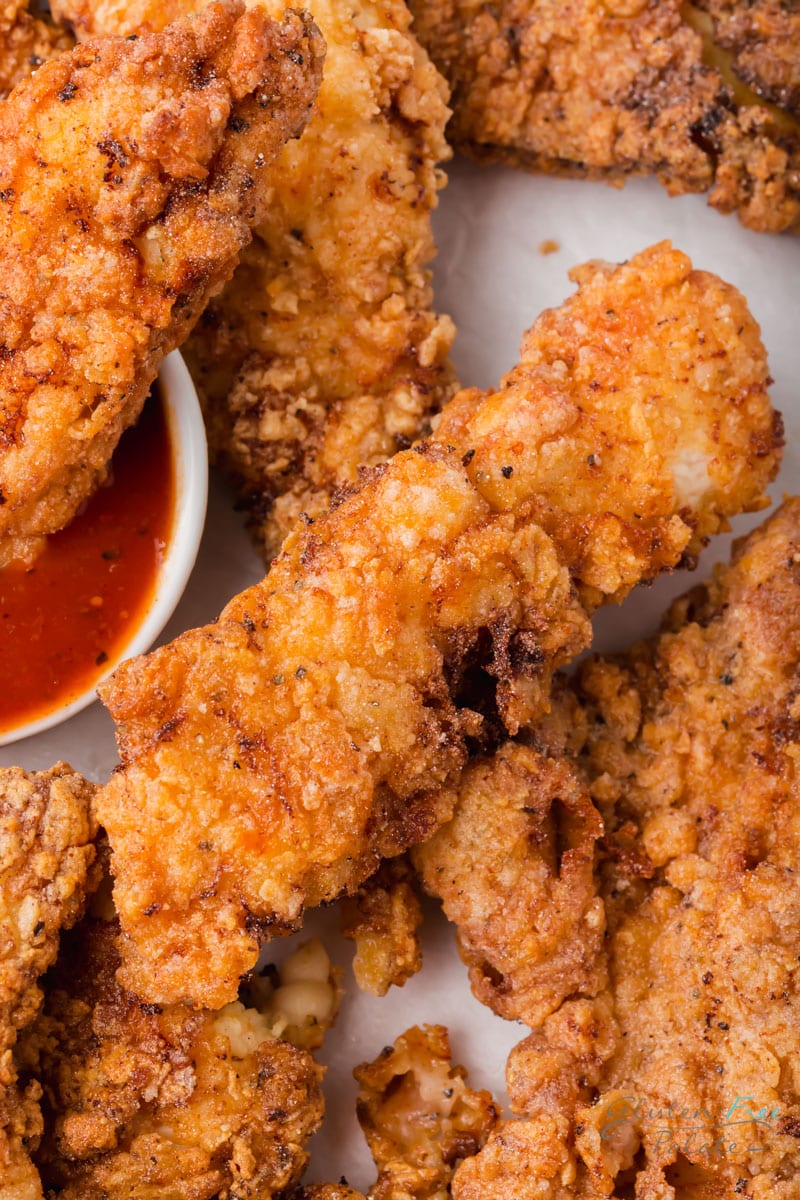Last Updated on April 23, 2025 by Pauline G. Carter
Chicken tenders are not gluten-free since they are typically coated in a breadcrumb mixture made from wheat flour. However, there are gluten-free alternatives available for those with dietary restrictions.
Discover more about the gluten content in chicken tenders and suitable alternatives below. Chicken tenders, also known as chicken strips, are a popular and tasty food item loved by many. These breaded and fried pieces of chicken are often served as snacks, appetizers, or even as a main course.
If you are following a gluten-free diet, you may be wondering whether chicken tenders are safe for you to consume. In short, chicken tenders are not gluten-free due to the breadcrumb coating that typically contains wheat flour. Gluten, a protein found in wheat, barley, and rye, can cause adverse reactions in individuals with gluten intolerance or celiac disease. Nonetheless, it’s important to note that some restaurants or food manufacturers offer gluten-free versions of chicken tenders that use alternative coatings. Let’s explore this topic further to help you make informed decisions about your dietary choices.
Gluten And Its Effects On Health
Chicken tenders are a popular menu item, but are they gluten-free? It’s important to understand that most chicken tenders are made with a breaded coating that contains gluten, so they are not suitable for those with gluten intolerance or celiac disease.
However, there are gluten-free options available for those who need them.
What is Gluten?
Gluten is a type of protein found primarily in wheat, barley, and rye. It acts as a glue-like substance that gives bread and other baked goods their elasticity and chewy texture. Gluten is also commonly used as a thickening agent in various processed foods.
How Does Gluten Affect People with Gluten Intolerance?
For individuals with gluten intolerance or celiac disease, the consumption of gluten can have detrimental effects on their health. Celiac disease is an autoimmune disorder that causes damage to the small intestine when gluten is ingested. This damage prevents the body from properly absorbing nutrients, leading to various health complications.
Gluten intolerance, also known as non-celiac gluten sensitivity, is a condition where individuals experience symptoms similar to celiac disease but without intestinal damage. These symptoms can vary from person to person and may include digestive issues, bloating, fatigue, headaches, and joint pain.
Exploring the Symptoms of Gluten Intolerance
Gluten intolerance can manifest through an array of symptoms, and it’s important to be aware of them for proper diagnosis and management. Some common signs of gluten intolerance include:
Digestive Issues
The most common symptoms of gluten intolerance are related to the digestive system. These can include bloating, abdominal pain, diarrhea, constipation, and gas.
Fatigue and Brain Fog
Gluten intolerance can also cause fatigue, brain fog, and difficulty concentrating. These symptoms can significantly affect daily productivity and overall well-being.
Skin Problems
Some individuals with gluten intolerance may experience skin problems such as rashes, eczema, or acne. These skin conditions may persist despite conventional treatments.
Joint and Muscle Pain
Gluten intolerance can contribute to joint and muscle pain, often resembling symptoms of arthritis. This can limit mobility and negatively impact the quality of life.
Mood Disorders
Another aspect of gluten intolerance is its potential effect on mental health. Some individuals may experience irritability, depression, anxiety, or mood swings when consuming gluten.
If you suspect gluten intolerance, it’s important to consult a medical professional for a proper diagnosis. Remember, self-diagnosis or eliminating gluten from your diet without medical guidance can lead to inaccurate results and potential nutrient deficiencies.
Gluten-free Diets And Food Choices
When it comes to dietary restrictions, gluten-free diets have gained significant popularity in recent years. Whether you have been diagnosed with celiac disease, a gluten intolerance, or simply choose to follow a gluten-free lifestyle for personal reasons, understanding the basics of gluten-free diets and food choices is essential. In this section, we will explore what a gluten-free diet entails, the benefits it offers for people with gluten intolerance, and the common gluten-containing foods that should be avoided.
What Is A Gluten-free Diet?
A gluten-free diet eliminates the consumption of gluten, a protein found in wheat, rye, and barley. For individuals with celiac disease or gluten intolerance, consuming gluten can cause a range of symptoms, including digestive issues, fatigue, and skin problems. By adhering to a gluten-free diet, these individuals can alleviate their symptoms and promote better overall health.
Benefits Of A Gluten-free Diet For People With Gluten Intolerance
A gluten-free diet can bring several benefits to individuals with gluten intolerance. By eliminating gluten from their diet, they can experience relief from symptoms such as bloating, diarrhea, and abdominal pain. Additionally, following a gluten-free diet can improve their energy levels and help them maintain a healthy weight. It is important to note that gluten-free diets should be followed under the guidance of a healthcare professional to ensure proper nutritional balance.
Common Gluten-containing Foods To Avoid
To successfully follow a gluten-free diet, it is crucial to be aware of the common gluten-containing foods that should be avoided. Here are some examples:
| Gluten-Containing Foods | Gluten-Free Alternatives |
|---|---|
| Wheat-based products (bread, pasta, cereals) | Rice-based products (gluten-free bread, gluten-free pasta, gluten-free cereals) |
| Barley | Gluten-free grains (quinoa, millet, amaranth) |
| Rye | Gluten-free grains and flours (rice flour, almond flour, coconut flour) |
In addition to these grains, it is important to carefully read food labels, as gluten can be hidden in sauces, condiments, and processed foods. Look for labels that indicate a product is “gluten-free” or has been certified gluten-free to be sure.
By understanding the basics of a gluten-free diet, its benefits for individuals with gluten intolerance, and the foods to avoid, you can make informed food choices and maintain a healthy, gluten-free lifestyle.
Gluten Status And Preparation Of Chicken Tenders
When it comes to gluten-free dining options, chicken tenders have become quite popular due to their delicious taste and crispy texture. However, before assuming that all chicken tenders are safe for those on a gluten-free diet, it’s important to understand their gluten status and how they are prepared.
Processing Methods that may Introduce Gluten into Chicken Tenders
Gluten can potentially find its way into chicken tenders during various processing methods. It is essential to be aware of these methods to make an informed decision about the suitability of chicken tenders for a gluten-free diet.
| Processing Method | Potential for Gluten Contamination |
|---|---|
| Breading | Most traditional breadings contain gluten, such as wheat flour or breadcrumbs made from wheat bread. Cross-contamination can occur if the same equipment or fryer used for gluten-containing products is also used for chicken tenders. |
| Marinades and Sauces | Most traditional breads contain gluten, such as wheat flour or breadcrumbs made from wheat bread. Cross-contamination can occur if the same equipment or fryer used for gluten-containing products is also used for chicken tenders. |
| Seasonings and Spices | Seasonings and spices may contain additives or fillers that include gluten. It’s important to read the labels carefully to determine if any gluten-containing ingredients are present. |
Label Reading and Certification for Gluten-Free Chicken Tenders
To ensure that the chicken tenders you choose are truly gluten-free, it’s essential to practice label reading and look for proper certifications. Manufacturers often label their products as “gluten-free” to cater to the growing demand in the market.
- Read the Ingredients List: Look for chicken tenders that explicitly state “gluten-free” on their packaging. Additionally, carefully read the ingredients list to check for any possible sources of gluten.
- Look for Certifications: Some trustworthy certifications for gluten-free products include the “Certified Gluten-Free” label from the Gluten-Free Certification Organization (GFCO) and the “Gluten-Free” label from the Gluten Intolerance Group (GIG).
By following these steps, you can confidently select chicken tenders that are safe for a gluten-free diet.

Credit: www.glutenfreepalate.com
Frequently Asked Questions For Are Chicken Tenders Gluten Free?
Are Chicken Tenders Gluten-free?
Chicken tenders can be gluten-free if they are made with gluten-free ingredients and prepared in a gluten-free environment.
What Are The Ingredients In Chicken Tenders?
Chicken tenders typically include chicken breast, batter or breading, and various seasonings. Ingredients may vary depending on the recipe or brand.
How Are Chicken Tenders Prepared?
Chicken tenders are usually coated in a batter or breading mixture, then fried or baked until they are golden brown and crispy.
Can I Find Gluten-free Chicken Tenders In Restaurants?
Some restaurants offer gluten-free chicken tenders as part of their menu options, but it’s always best to check with the restaurant beforehand.
What Are Alternative Options For Gluten-free Chicken Tenders?
If you are looking for gluten-free alternatives, you can try making chicken tenders with gluten-free flour or breadcrumbs, or opt for other protein options like tofu or seafood.
Can People With Celiac Disease Eat Chicken Tenders?
People with celiac disease should ensure that the chicken tenders they consume are prepared in a gluten-free environment and made with gluten-free ingredients.
Conclusion
It’s important to note that not all chicken tenders are gluten-free. While some restaurants and brands may offer gluten-free options, others may use breading or ingredients that contain gluten. Therefore, it’s crucial for individuals with gluten sensitivities or celiac disease to carefully read labels, inquire about ingredients, and choose reputable establishments to ensure they are consuming safe gluten-free chicken tenders.

